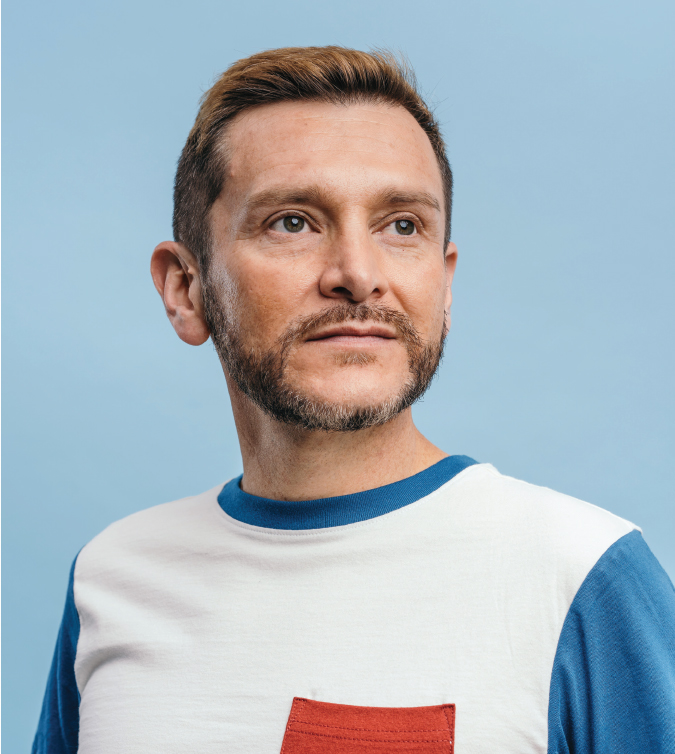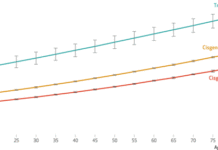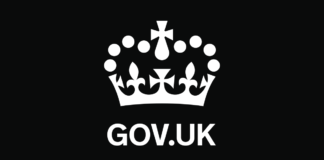June is celebrated as Pride Month. It marks the anniversary of the 1969 Stonewall Riots when patrons of New York City’s Stonewall Inn protested mistreatment by police. In June you will see “rainbow-washing” when companies festoon their corporate logos or advertisements with prism colors to appear as allies once a year. But at its core, June was designated as Pride Month because transgender and queer activists resisted discrimination at Stonewall. Because of those efforts, those of us in the LGBTQ community — myself included — can live with greater freedom to love and to define life on our own terms.
While everyone suffered during COVID-19, the LGBTQ community has had our own losses to mourn.
We watched organizers cancel Pride events and saw historic gay bars shutter. I can joke that Sunday brunch is “gay church,” but it’s not funny when you think about the loss of that important time with our chosen families. If you embrace a sexual identity that is something other than heterosexual or express gender in a nonbinary way, gathering with others who are like you can be essential to emotional health.
My community has its own inner conflicts, too. Last year forced Madison’s queer community to more directly confront its own racism. The Black Lives Matter movement continues to teach us all about the nuances of a movement for justice and equality.
Fortunately, our community was built on resilience as much as it was on resistance.
On the following pages, you’ll hear directly from a few Madisonians who help define our community. They are educators, entertainers and advocates for equality who improve our community’s health, happiness and safety.
They share how the events of the past pandemic year changed them and whether their sense of community shifted or deepened. Survival looked different to each person I spoke to. They redefined what it meant to gather by creating virtual spaces for connection and celebration. They marched and danced in the streets while taking a deeper look at racism, particularly within predominantly white LGBTQ spaces. They learned how to be vulnerable and accept help, whether it was asking friends to drop off groceries in quarantine or negotiating safety rules for “quaranteam” pods to combat loneliness or isolation.
All of these locals bring their full selves to everything they do. For them, Pride is not isolated to a month or a single event. From what they have learned and how they have changed, they are weaving new stories of survival, resilience, resistance and love.
Diego Campoverde Cisneros he/him/his
Diversity, equity and inclusion manager for Quartz and co-founder of Orgullo Latinx LGBT+
“The journey I embarked on in 2020 further accelerated my passion for diversity, equity and inclusion. On a professional level, we intentionally took a stance to not be quiet about the racism pandemic that our country is facing. On a personal level, the inner journey became more intense and I acknowledged even further my privilege, speaking up, providing support and reassurance to go beyond being an advocate of our historically marginalized communities.”
Tempestt Ballenger she/her/hers
DJ Femme Noir
“2020 turned the world upside down, but I learned that everything I desire — whether in relationships, my career or in DJing music — is on the other side of consistency. I learned that I had to make time to pause, reflect and focus on maintenance. A big part of that maintenance is getting help and support from my mom and my girlfriend. It’s also about being brutally honest about what I need to set boundaries to protect my mental health. When things shut down, the performance community shifted to doing everything online. We had virtual events and DJ sets. People crowdfunded to get the resources they needed and we raised money to support the bars we wanted to return to when the pandemic ends. It takes a lot of empathy to be consistent in our fight against COVID, but I’ve seen that empathy be more prevalent in the LGBT community. I think it’s because we want to return to those spaces that may be the first or only places where we can truly be ourselves. In order to preserve the spaces we love, we have to be consistent, set boundaries and have enough empathy to do what we have to do to keep each other safe.”
Keith Borden he/him/his
Yoga instructor
“I think of our lives before my husband and I moved from California to Madison in 2012, and it’s been a blessing to weather this pandemic in our neighborhood. Something I’ve struggled with in Madison, though, is this sense of politeness with the absence of warmth among people who don’t know each other. Warmth in the upper Midwest is not a given. Politeness, yes. Kindness is hit or miss. In my neighborhood, as we’ve spent more time outside to walk and play with our daughter, I’m seeing more waving and chatting on the street from a distance. There’s more willingness to acknowledge that we have to inhabit this space together. But I go two neighborhoods over and I might be invisible. It reminds me that Black people often live on the margins in Madison. It’s something I’ve never gotten used to. It’s like this in the queer community, too. It’s pretty common to have a queer community of color over here and the rest of the queer community over there. If we don’t have a community that lives together, we won’t experience true inclusion. Seeing people put up Black Lives Matter signs and go to protests was great. But they should pause and think of how many Black and brown people are their neighbors or coworkers. We can’t experience warmth and kindness unless you can get beyond the sphere of the people you know and who are close to you.”
Dina Nina Martinez she/her/hers
Comedian, actor and founder of Lady Laughs Comedy
“The most interesting thing about comedy moving to a virtual space is that I’m working with people I would never have gotten to work with. I’m doing events with people I haven’t seen since I left Los Angeles. I’m working with people in Germany, Japan, the UK, East Coast and West Coast. My work is a mix of old friends and new friends who can do comedy without the limitations of physical distance. It’s changed my ideas of what my business looks like. More importantly, I’ve always said that comedians can be both deep and dark. I’ve seen this more than ever in the last year we’ve been through. People who have faced adversity and can find humor in the darkness, we need to value that. Comedians are healers when we help people through hard times and have that space to laugh.”
Dr. Sami Schalk she/her/hers
Associate professor in the Department of Gender & Women’s Studies at the University of Wisconsin–Madison
“The COVID crisis and social distancing made connecting with others more labor intensive. This highlighted my real connections with other people. When my landlord did not renew my lease, I suddenly had 60 days to move in the middle of the pandemic. It was my friends in the queer community who really showed up for me to help me slowly and safely move into a space of my own. During the uprising last summer, I was very public about my support for Freedom Inc. and the youth protesters. I also was threatened on social media and by politicians. While I have support from friends all over the country, it was my friends in Madison who helped me feel safe. These local connections really matter. They helped me feel like this is truly my home now.”
Brian Maulana-Poncé he/him/his
Media and IT manager for OutReach LGBTQ+ Community Center and founder of Ravyn Entertainment
“Last summer I lost someone I knew to COVID. They were a local drag performer in their mid-20s who was very much alive and finding their own way by living in the moment. It happened so fast. Suddenly they were just gone. There was this void they filled for me and the LGBT community. There was a light that shined out of them and now that light is gone. A few months before they died, they helped OutReach record a video for our virtual Pride event and you can see how alive they were. You can see the passion in their eyes and you can feel the energy in their song. You try to remember the person and not what they went through. COVID made me see that those who are the most cautious about the pandemic are the ones who are most likely to think about other people. They are more compassionate because they know how much we’ve lost.”
Bernie Hoes he/him/his
Educator
“One word that comes to mind after what we went through in 2020 is ‘vulnerable.’ The Black Lives Matter movement made me realize how vulnerable I am as a Black man. Having a COVID-positive diagnosis made me realize how vulnerable I would be in Madison’s health care system as a Black man. But through all of this vulnerability, there was also a greater sense of community because of the Black Lives Matter movement. I’m comforted to finally have a doctor who listens and sees me as a Black, gay man. Having COVID brought me closer to my inner circle of friends in the LGBT community. I’ve come out of this feeling like a stronger person and I feel like the voices of the African American community are finally being heard.”
Brandon Rounds he/him/his
Partnerships and events manager at the Fitchburg Chamber Visitor + Business Bureau who also performs as Bianca Lynn Breeze
“For some people, their first experience with the gay community is meeting a drag queen, going to a drag show or watching ‘RuPaul’s Drag Race.’ It brings so much joy and happiness. That’s why it was so disappointing when the state shut down and we had to cancel performances at FIVE Nightclub. I’m an extrovert, so staying inside and not connecting with people was really hard.”
“I asked my roommate, who performs as Kendra Banx$, about doing drag bingo virtually, and she said yes. For 13 weeks we performed live online. People told us how much they looked forward to it — that they knew it was Thursday night because it was bingo night. Straight couples put the kids to bed and joined us online. We gave some of the money we raised to Willma’s Fund [a program that addresses LGBTQ homelessness], and we raised money to support FIVE Nightclub, which is among the LGBTQ establishments that are really struggling to stay open. Doing drag online gave us all some hope and happiness.”
Monty Scott he/him/his
Disease intervention specialist at Public Health Madison & Dane County
“2020 made me think even more deeply about the underlying and interconnected issues that link to our sexual health, including racism and social disparities, and how much more work we need to do to better ourselves as a community. Working in public health, I try to put a sex-positive message out there that you can take precautions, stay safe and stay healthy, but still take the pandemic seriously. I do everything I can to share positive information online. But I also learned — and I can’t stress this enough — you have to take care of yourself. After the death of George Floyd, I took a week off of social media just for my own mental health.”
Denise Jess she/her/hers
CEO/executive director of the Wisconsin Council of the Blind and Visually Impaired
“My partner’s and my friendships with other lesbian couples have made me feel like I’m not isolated. We have our bubble and connect with other couples every week on Zoom. While I think about issues of race, ability and economic well-being every day, because I’m in a long-term relationship and have long-term friendships I’m aware that having a support system is an enormous form of privilege. I think about the young LGBTQ kids and young adults, or older adults who are single, and what this time has been like for them. Jani and I have been together for 30 years and it was our anniversary last August. We had hoped to celebrate with lots of friends and family and really do it up. In the end we just spent it with one other couple. It was very sweet and it was its own gift to break out of what we would have done. It didn’t feel diminished at all.”
Abby Churchill she/her/hers
Founder and director of Trans Law Help Wisconsin and product management consultant at CUNA Mutual Group
“Before COVID, participating in my community meant hanging out with friends, playing recreational sports like softball, participating in the Madison Gay Hockey Association and volunteering with local LGBT nonprofits. All of that came to a halt last year, but I stayed connected with my community in ways that could be adapted; I have used technology in an effort to foster, grow and support my community. For example, Trans Law Help Wisconsin began offering virtual name and gender marker change clinics. While we still have room to grow in making our clinics more and more accessible, this has allowed for easier access for those who couldn’t otherwise attend our in-person clinics. Another example is from my personal life: I started playing a lot more Dungeons and Dragons. It keeps me connected to friends but is also an opportunity to jump into a captivating story and shift my focus, just for a little bit of time, away from the devastating global pandemic raging on in the real world. Connecting to my community didn’t go away. It just changed. The pandemic has also forced me to slow down and prioritize. I’m involved in so many things and it’s hard for me to say no, especially to helping my community. This has taught me that I need to slow down if I’m going to be able to take care of myself and others.”
Stacy Harbaugh is a freelance Madison writer and marketing specialist through Unstuck Communications. The direct quotes in this feature have been edited for length and clarity.
COPYRIGHT 2021 BY MADISON MAGAZINE. ALL RIGHTS RESERVED. THIS MATERIAL MAY NOT BE PUBLISHED, BROADCAST, REWRITTEN OR REDISTRIBUTED.




















